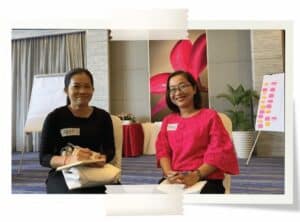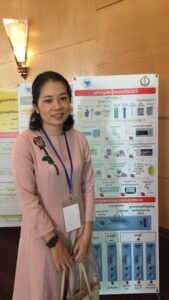Meet Ms. Soth Sotheary,

(Ms. Soth Sotheary (on the left) during the Building Bridges programme)
Ms. Soth Sotheary was born in Pursat Province in the northwest of Cambodia, 185 kilometres from Phnom Penh where she moved to simultaneously earn two degrees; a Bachelor Degree of Art in communication skills and her medical doctor degree. Despite difficulties adapting to the modern city away from her family, she was inspired and determined to help others especially those who are underprivileged, she became a medical doctor at a hospital in Phnom Penh from 2012 to 2019.

Fast forward to today, Sotheary is currently serving as a trainer on first aid and Covid-19 for the Occupational and Hygiene Office in the Department of Occupational Safety and Health (DOSH). The global fashion industry is one of the most female-dominated industries in the world, and Cambodia is no exception, but despite the fact that women make up 80% of the 700,000 workers who are responsible for Cambodia’s biggest exports, women are disproportionately represented in garment sector leadership roles.
The Building Bridges Programme is a learning series that has continued since August 2018, the programme aims to bring Cambodian stakeholders together in a joint learning process that builds trust and understanding of the different approaches, and includes Occupational Safety and Health (OSH) officials and inspectors, labour inspectors, manufacturers, employers’ organization, trade unions, and buyers’ participants. It is in line with BFC’s sustainability strategy which is to ultimately ensure that Cambodia can increasingly rely on national actors to take greater responsibility for labour law enforcement and support effective platforms for dialogue between employers and workers, and that female voice, representation, and leadership guide this evolution.
The programme is bridging the gap between the existing and required expertise and skills for stakeholders who will be at the forefront in shaping the future of the garment and footwear, and other expanding export sectors.
Ms. Soth Stoheary realizes that with the ongoing pandemic, her role is more crucial than ever to ensure the safety and health of all workers. Through her works, she hopes that employees and employers understand how important safety at the workplace and worker’s health are; how these key understandings will translate to safer and more productive workplaces, and workplaces that can steadily evolve to ensure female representation both at the worker and management level.
As a trainer, one of the immediate action that she was able to implement after the programme was the ability to communicate with workers and manufacturers on:
- promoting the usage of Personal Protective Equipment (PPE) at work
- work-relate risk and hazards
- fundamental first aid
- linkage of work safety and productivity
“Communication is not only crucial at work but also with our family, it emphasizes listening more than talking — a good listener can understand the other’s intention/information and make a better decision for all parties. A good listener starts with asking the right questions and being open-minded. Communication was one of the skills from the Building Bridges Programme that I adapted to my work, I can say that my influencing skills have improved especially through helping workers to understand work-related risks and hazards, how to correctly wear PPEs and how they can be a part of making their workplace safer.”
The Building Bridges Programme aims to work with actors like Sotheary to create a pathway for national actors to take greater responsibility in labour law enforcement and to be at the centre of supporting and improving dialogue between employers and workers. An area that is not only at the core of compliant and productive workplaces, but also essential to responding to the Covid-19 pandemic in Cambodia, and will be key to Cambodia’s recovery from the pandemic over the coming years.